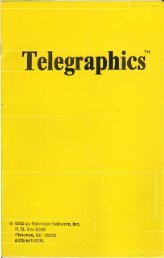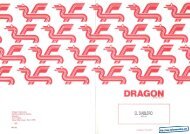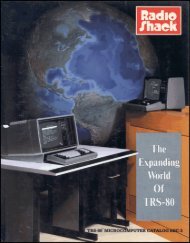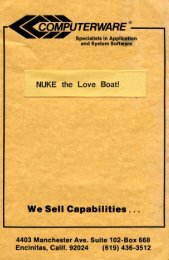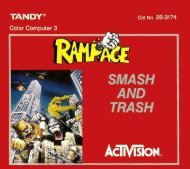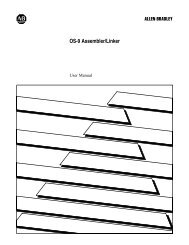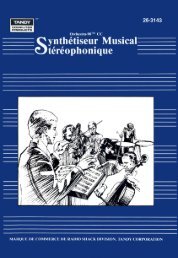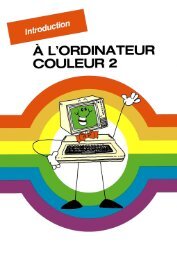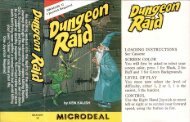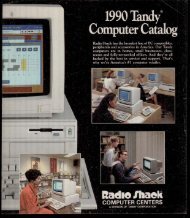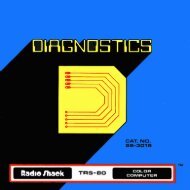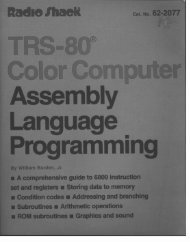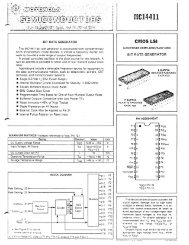& LIGHT-YEARS! - TRS-80 Color Computer Archive
& LIGHT-YEARS! - TRS-80 Color Computer Archive
& LIGHT-YEARS! - TRS-80 Color Computer Archive
You also want an ePaper? Increase the reach of your titles
YUMPU automatically turns print PDFs into web optimized ePapers that Google loves.
etween the desire to put a lot of<br />
information into the game—especially<br />
when you're conversing with game<br />
characters—and the problem of<br />
putting huge amounts of text into<br />
memory and onto the tiny screen.<br />
Buiter has put the text into a book of<br />
"paragraphs." When you encounter<br />
the right character in the game, you<br />
are referred to the book to find out<br />
what he says.<br />
The paragraphs are believable di<br />
alogue, very well written (a rarity in<br />
games; compare it with the embarrass<br />
ingly bad writing in the Ultima series,<br />
for instance). To keep you from cheating and reading the<br />
paragraphs ahead, there are false clues; if you're peeking,<br />
you'll end up on wild goose chases that accomplish<br />
nothing.<br />
Your sensors immediately peg strangers as hostile or<br />
friendly. You can talk to the friendlies and can only fight<br />
with or flee from the hostiles. Not too subtle (don't you<br />
wish you had a machine like that?), but it's better than just<br />
killing anything that moves.<br />
Some of the world creation is medium-dumb: a planet<br />
where there are only two seasons—at every latitude? And<br />
Buiter has a rather lackluster sense of naming; he puts lots<br />
of unpronounceable letters together to fake alienness in<br />
stead of developing the sense of a linguistic tradition.<br />
But the game world is big enough to accommodate dif<br />
ferent experiences, and it doesn't force you into set pat<br />
terns. You can explore randomly, having the adventures<br />
you want to have. I call it the best of the space adventure<br />
games, and it placed high on Geoffrey's list as well.<br />
Firezone<br />
This simple futuristic war game has beautiful graphics and<br />
simple, intuitive controls. If you've ever played a war game<br />
before, you can literally start to play Firezone the moment<br />
it comes onto the screen. This was obviously one of the<br />
game designer's goals: The directions include Quickstart<br />
Creating Characters<br />
Most games that let you assemble a group of characters to take<br />
part in your adventures follow the role-playing pattern set years<br />
ago by the paper game Dungeons & Dragons. Your characters<br />
are different from each other because they have a range of abil<br />
ities. Some have a great deal of strength but aren't too bright.<br />
Some have considerable dexterity and quickness, but they're<br />
quite frail and can't withstand much injury.<br />
Strengths in one area mean weaknesses in another—no<br />
one character has it all. Thus all the characters in your party are<br />
necessary to overcome obstacles and accomplish your goals.<br />
Most of these games follow that basic pattern, but with vari<br />
ations. Sentinel Worlds, for instance, lets you choose faces for<br />
your characters from a group of pictures. Star Flight and Star<br />
Command require you to put your characters through training<br />
before they become reliable in using their skills. Star Command<br />
amusingly takes you through the ups and downs of your charac<br />
ters' education until they finally get good enough to bring along<br />
on your adventure.<br />
Most games use the standard ability groups: strength,<br />
dexterity, intelligence, and endurance. Star Command adds<br />
Esper ability, which serves the role that magical ability serves in<br />
fantasy games. Star Flight uses categories that apply to specific<br />
jobs on your starship: Characters train in areas like medicine,<br />
32 COMPUTEI<br />
instructions for those who don't want<br />
to bother with thick rule books.<br />
Yet despite its simplicity,<br />
Firezone is fascinating, with infinite<br />
choices in both strategy and tactics. If<br />
you play alone, the computer is a<br />
tough but fair opponent. If you play<br />
head to head with someone else, you<br />
can play the same scenario again with<br />
vastly different results. And the game<br />
includes a construction set, so you can<br />
devise more scenarios—though you<br />
won't soon tire of the ones that come<br />
with the game.<br />
This could have been a World<br />
War II simulation; setting it in the future adds little, except<br />
that the designer avoids the standard villains. There's none<br />
of this us-against-the-Nazis or us-against-the-commies stuff.<br />
As science fiction, the game isn't much, but it's still a<br />
fine war game. It is Geoffrey's absolute favorite.<br />
Star Command<br />
This game wants to be Star Flight or Sentinel Worlds, but<br />
it isn't. The setup phase is tedious and too detailed, though<br />
there are touches of wit in training crew members.<br />
It isn't just the primitive graphics; the look of the game<br />
is certainly adequate, and the screen communicates well.<br />
And there's some decent invention in the scenario. The<br />
problem is that there's no sense of experiencing anything.<br />
Mostly you're told about what's going on, and after a short<br />
time it seemed to me that it was a text game which con<br />
sisted of getting assignments from mission control and<br />
mechanically going out. doing them, and coming back. I<br />
wasn't having fun. Geoffrey did find it playable, though it<br />
isn't high on his list.<br />
Wasteland<br />
This game owes a lot to the Ultima series of fantasy games.<br />
You move through a map of post-nuclcar-holocaust Amer<br />
ica, entering surface villages and underground dungeons.<br />
The world creation is interesting and fun—not just jokes<br />
languages, navigation, engineering, and science.<br />
The benefit of this is that you get the sense that you're<br />
playing with well-drawn individual characters. You begin to feel<br />
that you know them personally; you're responsible for keeping<br />
them from getting killed. The drawback is that spending too<br />
much time creating the characters and manipulating them<br />
through the game becomes extremely tedious.<br />
This is particularly true in the area o! weapons and armor.<br />
Maybe some players really enjoy dressing up their characters<br />
like dolls. Star Command has more weapons options than I ever<br />
wanted. But if you're someone who cares about the difference<br />
between an LTV Ranger Seeker Missile and an SS-29 Bulldog<br />
Missile, go for it.<br />
I prefer the approach of Firezone: The game's choices are<br />
few, but those choices differ significantly. This is no more limit<br />
ing than, say, chess, with only a few kinds of pieces that never<br />
theless allow almost infinite possibilities.<br />
And Wasteland, with its full cast of interesting characters,<br />
lets you skip character generation altogether. You can use the<br />
existing characters and get right into the game, or, if you prefer,<br />
you can start from scratch and create your own. I like having<br />
that choice.




